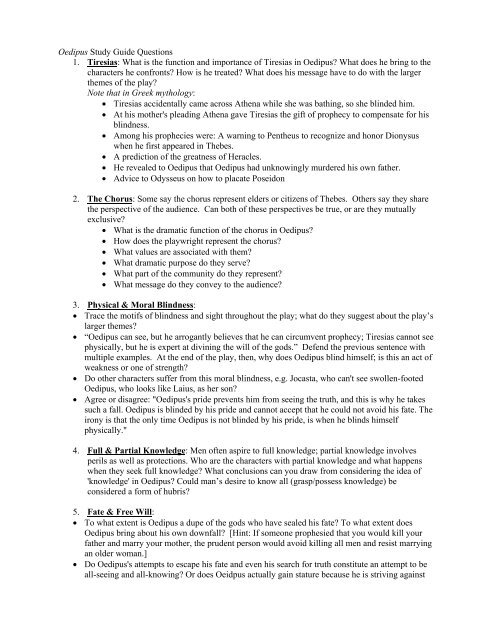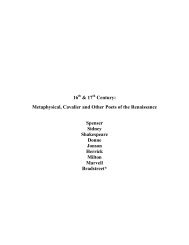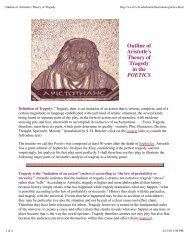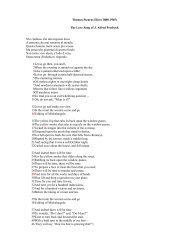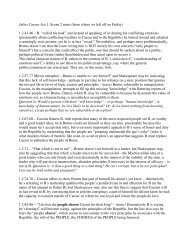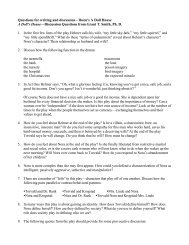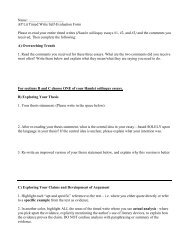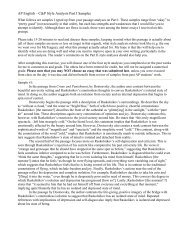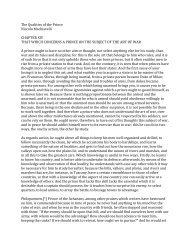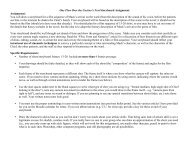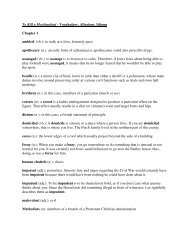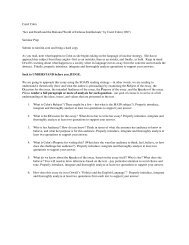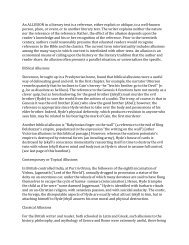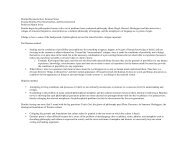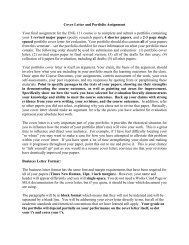Oedipus Study Guide Questions 1. Tiresias: What is the function and ...
Oedipus Study Guide Questions 1. Tiresias: What is the function and ...
Oedipus Study Guide Questions 1. Tiresias: What is the function and ...
Create successful ePaper yourself
Turn your PDF publications into a flip-book with our unique Google optimized e-Paper software.
<strong>Oedipus</strong> <strong>Study</strong> <strong>Guide</strong> <strong>Questions</strong><strong>1.</strong> <strong>Tiresias</strong>: <strong>What</strong> <strong>is</strong> <strong>the</strong> <strong>function</strong> <strong>and</strong> importance of <strong>Tiresias</strong> in <strong>Oedipus</strong>? <strong>What</strong> does he bring to <strong>the</strong>characters he confronts? How <strong>is</strong> he treated? <strong>What</strong> does h<strong>is</strong> message have to do with <strong>the</strong> larger<strong>the</strong>mes of <strong>the</strong> play?Note that in Greek mythology:• <strong>Tiresias</strong> accidentally came across A<strong>the</strong>na while she was bathing, so she blinded him.• At h<strong>is</strong> mo<strong>the</strong>r's pleading A<strong>the</strong>na gave <strong>Tiresias</strong> <strong>the</strong> gift of prophecy to compensate for h<strong>is</strong>blindness.• Among h<strong>is</strong> prophecies were: A warning to Pen<strong>the</strong>us to recognize <strong>and</strong> honor Dionysuswhen he first appeared in Thebes.• A prediction of <strong>the</strong> greatness of Heracles.• He revealed to <strong>Oedipus</strong> that <strong>Oedipus</strong> had unknowingly murdered h<strong>is</strong> own fa<strong>the</strong>r.• Advice to Odysseus on how to placate Poseidon2. The Chorus: Some say <strong>the</strong> chorus represent elders or citizens of Thebes. O<strong>the</strong>rs say <strong>the</strong>y share<strong>the</strong> perspective of <strong>the</strong> audience. Can both of <strong>the</strong>se perspectives be true, or are <strong>the</strong>y mutuallyexclusive?• <strong>What</strong> <strong>is</strong> <strong>the</strong> dramatic <strong>function</strong> of <strong>the</strong> chorus in <strong>Oedipus</strong>?• How does <strong>the</strong> playwright represent <strong>the</strong> chorus?• <strong>What</strong> values are associated with <strong>the</strong>m?• <strong>What</strong> dramatic purpose do <strong>the</strong>y serve?• <strong>What</strong> part of <strong>the</strong> community do <strong>the</strong>y represent?• <strong>What</strong> message do <strong>the</strong>y convey to <strong>the</strong> audience?3. Physical & Moral Blindness:• Trace <strong>the</strong> motifs of blindness <strong>and</strong> sight throughout <strong>the</strong> play; what do <strong>the</strong>y suggest about <strong>the</strong> play’slarger <strong>the</strong>mes?• “<strong>Oedipus</strong> can see, but he arrogantly believes that he can circumvent prophecy; <strong>Tiresias</strong> cannot seephysically, but he <strong>is</strong> expert at divining <strong>the</strong> will of <strong>the</strong> gods.” Defend <strong>the</strong> previous sentence withmultiple examples. At <strong>the</strong> end of <strong>the</strong> play, <strong>the</strong>n, why does <strong>Oedipus</strong> blind himself; <strong>is</strong> th<strong>is</strong> an act ofweakness or one of strength?• Do o<strong>the</strong>r characters suffer from th<strong>is</strong> moral blindness, e.g. Jocasta, who can't see swollen-footed<strong>Oedipus</strong>, who looks like Laius, as her son?• Agree or d<strong>is</strong>agree: "<strong>Oedipus</strong>'s pride prevents him from seeing <strong>the</strong> truth, <strong>and</strong> th<strong>is</strong> <strong>is</strong> why he takessuch a fall. <strong>Oedipus</strong> <strong>is</strong> blinded by h<strong>is</strong> pride <strong>and</strong> cannot accept that he could not avoid h<strong>is</strong> fate. Theirony <strong>is</strong> that <strong>the</strong> only time <strong>Oedipus</strong> <strong>is</strong> not blinded by h<strong>is</strong> pride, <strong>is</strong> when he blinds himselfphysically."4. Full & Partial Knowledge: Men often aspire to full knowledge; partial knowledge involvesperils as well as protections. Who are <strong>the</strong> characters with partial knowledge <strong>and</strong> what happenswhen <strong>the</strong>y seek full knowledge? <strong>What</strong> conclusions can you draw from considering <strong>the</strong> idea of'knowledge' in <strong>Oedipus</strong>? Could man’s desire to know all (grasp/possess knowledge) beconsidered a form of hubr<strong>is</strong>?5. Fate & Free Will:• To what extent <strong>is</strong> <strong>Oedipus</strong> a dupe of <strong>the</strong> gods who have sealed h<strong>is</strong> fate? To what extent does<strong>Oedipus</strong> bring about h<strong>is</strong> own downfall? [Hint: If someone prophesied that you would kill yourfa<strong>the</strong>r <strong>and</strong> marry your mo<strong>the</strong>r, <strong>the</strong> prudent person would avoid killing all men <strong>and</strong> res<strong>is</strong>t marryingan older woman.]• Do <strong>Oedipus</strong>'s attempts to escape h<strong>is</strong> fate <strong>and</strong> even h<strong>is</strong> search for truth constitute an attempt to beall-seeing <strong>and</strong> all-knowing? Or does Oeidpus actually gain stature because he <strong>is</strong> striving against
<strong>the</strong> gods?6. Hamartia in <strong>Oedipus</strong>: <strong>What</strong> <strong>is</strong> <strong>Oedipus</strong>’s flaw or error? h<strong>is</strong> arrogance? h<strong>is</strong> unrelenting desire fortruth? h<strong>is</strong> desire to be, again, <strong>the</strong> savior of Thebes? h<strong>is</strong> striving against <strong>the</strong> gods <strong>and</strong> fate? Does<strong>Oedipus</strong> have a tragic flaw, or does he simply make a “m<strong>is</strong>take”?7. Jocasta:• When did Jocasta know that <strong>Oedipus</strong> was <strong>the</strong> baby she had ordered to be killed? Sheshould have known him when she first saw h<strong>is</strong> feet (<strong>the</strong> name, "<strong>Oedipus</strong>," literally means"swollen foot," or maybe even "wounded foot"), but did she? Pinpoint in <strong>the</strong> play whenJocasta seems to know--<strong>is</strong> it only right before she kills herself, or could it have been sometime before that?• How are Lady Macbeth <strong>and</strong> Jocasta similar in <strong>the</strong> ways <strong>the</strong>y try to comfort <strong>the</strong>irhusb<strong>and</strong>s?• Why does Jocasta try to undermine prophecy? Does Jocasta love <strong>Oedipus</strong>? Does Jocastadownplay <strong>the</strong> prophecies to spare her beloved husb<strong>and</strong>--or <strong>is</strong> she trying to spare herselfpublic shame?8. Verbal Irony:• Trace instances of verbal irony (including intentional sarcasm?) in <strong>the</strong> confrontations between<strong>Oedipus</strong> <strong>and</strong> Creon as well as <strong>Oedipus</strong> <strong>and</strong> Teresias.• Does Jocasta speak verbal irony, or does her attempt to calm <strong>Oedipus</strong> by debunking prophecyresult in dramatic irony--<strong>the</strong> unexpected happening?9. Dramatic irony <strong>is</strong> created when a statement made by a character has one meaning for <strong>the</strong> speaker<strong>and</strong> <strong>and</strong> additional <strong>and</strong> quite different one for <strong>the</strong> audience. For example, at <strong>the</strong> beginning of <strong>the</strong>play, <strong>Oedipus</strong> <strong>is</strong> enraged at Laius' death <strong>and</strong> he wants to hunt down <strong>the</strong> killer; he talks about all<strong>the</strong> terrible things he wants to do to <strong>the</strong> killer, yet <strong>the</strong> audience knows that he <strong>is</strong> <strong>the</strong> killer. Th<strong>is</strong> <strong>is</strong>dramatic irony.• Give examples <strong>and</strong> state <strong>the</strong> impact of dramatic irony on <strong>the</strong> story of <strong>Oedipus</strong>?• How does <strong>the</strong> dramatic irony increase <strong>the</strong> sense of tragedy?Examples of irony:• One riddle, <strong>the</strong> Sphinx's riddle, makes him a great powerful king while <strong>the</strong> o<strong>the</strong>r riddle,<strong>Tiresias</strong>' riddle, will destroy him.• <strong>Tiresias</strong> <strong>is</strong> blind <strong>and</strong> can see <strong>the</strong> truth, hence him being a blind prophet. <strong>Oedipus</strong> can see butcan't see <strong>the</strong> truth (killing h<strong>is</strong> fa<strong>the</strong>r <strong>and</strong> Jocasta being h<strong>is</strong> mo<strong>the</strong>r), but once <strong>Oedipus</strong> sees <strong>the</strong>truth he blinds himself.• When <strong>the</strong> gods tell <strong>Oedipus</strong> h<strong>is</strong> fate, <strong>Oedipus</strong> runs away from Corinth-- apparently awayfrom h<strong>is</strong> "parents"--<strong>and</strong> goes to Thebes. But he <strong>is</strong> actually running towards h<strong>is</strong> problems notaway.• He <strong>is</strong> ab<strong>and</strong>oned on Mt. Cithaeron as a baby <strong>and</strong> <strong>is</strong> saved. Now he <strong>is</strong> going back to <strong>the</strong> sameMountain to die.• <strong>Oedipus</strong> becomes <strong>the</strong> Sphinx. He protects <strong>the</strong> city, but in time becomes a pollution. TheSphinx protected <strong>the</strong> city, but would kill anyone who answered <strong>the</strong> riddle falsely.• The riddle of <strong>the</strong> Sphinx <strong>is</strong> <strong>Oedipus</strong>'s own life. Think about it.• The truth was ALWAYS right in front of <strong>Oedipus</strong> (h<strong>is</strong> feet). He was blind to <strong>the</strong> facts.Ironically, <strong>the</strong> only time he saw <strong>the</strong> truth was when he blinded himself physically.• Laius <strong>and</strong> Jocasta helped fulfill <strong>the</strong> destiny by not insuring <strong>the</strong> death of <strong>the</strong>ir child. Theyplayed it off as going perfectly as planned, although <strong>the</strong> gods had already ruled out th<strong>is</strong>destiny.• <strong>Tiresias</strong> <strong>is</strong> essentially what <strong>Oedipus</strong> becomes.
Dramatic Devices (besides irony):A. Hyperbole (exaggeration): Are <strong>the</strong>re places in <strong>the</strong> story where exaggeration seems to be deliberatelyused by <strong>the</strong> speaker, making <strong>the</strong> event reported larger or more important than it <strong>is</strong>? (Hint: CheckCreon's report of <strong>the</strong> Oracle <strong>and</strong> Teresias' predictions about <strong>Oedipus</strong>.)B. Foreshadowing: <strong>What</strong> instances of foreshadowing are <strong>the</strong>re in <strong>the</strong> play, <strong>and</strong> how to <strong>the</strong>y help build asense of inevitability?C. Dichronic Time: Sophocles uses flashbacks to recover pieces of <strong>Oedipus</strong>'s past <strong>and</strong> create <strong>the</strong>cumulative force of inevitability that comes down on <strong>Oedipus</strong> when he recognizes that he <strong>is</strong> <strong>the</strong>killer of Laius AND that Laius was h<strong>is</strong> biological fa<strong>the</strong>r (<strong>and</strong> Jocasta h<strong>is</strong> real mo<strong>the</strong>r). Trace <strong>the</strong>movement of time in <strong>the</strong> play <strong>and</strong> l<strong>is</strong>t <strong>the</strong> clues that accumulate to pin down exactly who <strong>Oedipus</strong> <strong>is</strong>.D. Contrast/Conflict: man vs. man (<strong>Oedipus</strong> vs. Creon), man vs. nature (<strong>Oedipus</strong> vs. <strong>the</strong> plague), manvs. himself (<strong>Oedipus</strong> altru<strong>is</strong>m vs. h<strong>is</strong> pride), man vs. <strong>the</strong> gods (<strong>Oedipus</strong> vs. <strong>the</strong> oracles, [also Laius<strong>and</strong> Jocasta] vs. <strong>the</strong> prophecy).E. Reversal (of fortune) – see belowF. Recognition: When <strong>the</strong> shepherd <strong>and</strong> former servant of Laius confirms that he gave <strong>the</strong> baby to <strong>the</strong>shepherd from Corinth <strong>and</strong> that he got baby <strong>Oedipus</strong> from Queen Jocasta, <strong>Oedipus</strong> realizes that he <strong>is</strong>that baby, that <strong>the</strong> man he killed where three roads meet was Lau<strong>is</strong>, <strong>and</strong> that Lau<strong>is</strong> was h<strong>is</strong> fa<strong>the</strong>r--<strong>and</strong> Jocasta h<strong>is</strong> mo<strong>the</strong>r. Aha! <strong>and</strong> ruin (reversal of fortune from king to exile) occur in <strong>the</strong> sameinstant.G. Investigative Results: In <strong>the</strong> course of <strong>the</strong> investigation regarding Laius' murder, many facts cameout supporting <strong>the</strong> suspicion that <strong>Oedipus</strong> killed Laius. <strong>What</strong> were <strong>the</strong>se statements <strong>and</strong> accusations?Why was <strong>Oedipus</strong> not convinced initially <strong>and</strong> what was h<strong>is</strong> reaction to such accusation? <strong>What</strong> do<strong>the</strong>se facts reveal <strong>Oedipus</strong> as a character?H. Universals: Ar<strong>is</strong>totle wrote that <strong>the</strong> difference between h<strong>is</strong>tory <strong>and</strong> poetry <strong>is</strong> that poetry <strong>is</strong> a morephilosophical <strong>and</strong> serious business than h<strong>is</strong>tory; for poetry speaks more of universals (what canhappen) than h<strong>is</strong>tory of particulars (what did happen). <strong>What</strong> do you think <strong>is</strong> universal about <strong>the</strong> play<strong>Oedipus</strong> Rex? Is it <strong>the</strong> plot, <strong>the</strong> characterization, <strong>the</strong> <strong>the</strong>me or some combination of <strong>the</strong>se or o<strong>the</strong>relements? Explain your answer using concrete references to <strong>the</strong> play.I. Imagery: From <strong>the</strong> priest's description of <strong>the</strong> "ship of state" awash in a raging see of plague to <strong>the</strong>"red hail" described by <strong>the</strong> messenger, th<strong>is</strong> play <strong>is</strong> full of figurative language, especially in <strong>the</strong> choralodes. Find, cite by line number, quote, <strong>and</strong> explain 5 important images. How do <strong>the</strong>se images helpto set a tone for <strong>the</strong> play--<strong>and</strong> what <strong>is</strong> that tone? Imagery to look for: sickness <strong>and</strong> pollution, <strong>the</strong>ship of state, blindness vs. sight, light vs. darknessJ. Foils: How are Creon <strong>and</strong> <strong>Tiresias</strong> both foils of <strong>Oedipus</strong>--whose personalities have traits opposite to<strong>Oedipus</strong>, <strong>the</strong>reby exposing aspects of O's character? Of <strong>the</strong> two, who <strong>is</strong> <strong>the</strong> more effective atbringing to our notice O's personality traits?“Real World” Connections:10. Why, do you think, <strong>is</strong> <strong>the</strong> play, <strong>Oedipus</strong> <strong>the</strong> King, still read today? <strong>What</strong> does <strong>the</strong> play hold for amodern audience? For instance-- Does th<strong>is</strong> play reflect on <strong>the</strong> notion that our lives aredetermined ei<strong>the</strong>r by our genetic heritage or by our upbringing (nature vs. nurture)?1<strong>1.</strong> How important <strong>is</strong> illusion in life? Give examples to support, <strong>and</strong> relate to <strong>Oedipus</strong>.


